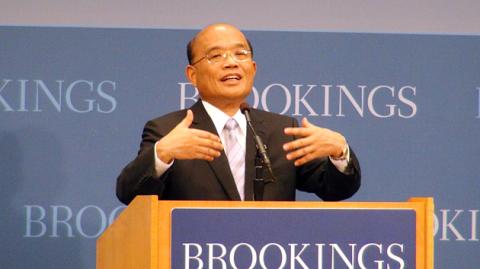|
DPP fully committed
to Taiwan¡¦s self-defense, Su says
By William Lowther / Staff reporter in WASHINGTON

Democratic Progressive Party
Chairman Su Tseng-chang delivers a speech at the Brookings Institution in
Washington on Thursday.
Photo: CNA
Taiwan must demonstrate that it is serious
about its defense, Democratic Progressive Party (DPP) Chairman Su Tseng-chang
(Ĭs©÷) said on Thursday in Washington.
¡§I guarantee you, a future DPP government will be fully committed to Taiwan¡¦s
self-defense,¡¨ Su told the Brookings Institution.
He said that US-Taiwan relations needed to be rebalanced and that Taipei should
not ask what the US could do for Taiwan, but rather ask what Taiwan could do to
earn Washington¡¦s support.
¡§Democracy and security do not fall from heaven ¡X they come with a cost,¡¨ he
said.
¡§In the past few years, the cross-strait military imbalance has become more
serious, but Taiwan¡¦s investment in defense is growing smaller. It is time for
us to demonstrate that we are serious,¡¨ Su added.
The DPP had always considered the US to be Taiwan¡¦s most important democratic,
security and economic partner, Su said.
Peppered with questions about how the DPP would handle cross-strait relations,
Su said it would not provoke Beijing.
¡§We understand that China is getting stronger and stronger, and people are doing
business across the Taiwan Strait and we support that,¡¨ he said.
Stressing that he was both principled and pragmatic, Su said the sovereignty of
Taiwan could not be negotiated.
¡§We look forward to good relations and friendship with China,¡¨ he said.
However, at the same time Su said that China should shoulder more international
and regional responsibilities, and be more conducive to regional peace and
stability.
¡§We urge the PRC [People¡¦s Republic of China] not to push Taiwan into a corner,¡¨
Su said. ¡§Taiwan definitely needs to reinforce its self-defense capabilities ¡X
the idea is to safeguard Taiwan¡¦s sovereignty and the people¡¦s security.¡¨
Taipei must maintain a minimum capability and demonstrate determination that if
China attacks Taiwan it will ¡§pay a huge price,¡¨ he said.
A minimum defense budget ¡X higher than the current budget ¡X has to be maintained
to ensure that Taiwan could survive an attack, he said.
Su said there was no need for China to target a large number of missiles at
Taiwan and that if Beijing really wanted to win Taiwanese hearts and minds it
should use goodwill and sincerity.
He said he was conducting ¡§very candid¡¨ discussions in Washington and had
assured the US that under a DPP administration there would be ¡§no surprises¡¨ and
policies would be consistent.
¡§The DPP will be responsible, but we will not give up on principles,¡¨ he said.
¡§I have made tremendous efforts to show that the DPP is credible in cross-strait
relations.¡¨
Su said China had never given up its goal to lock Taiwan into a ¡§one China¡¨
framework. The more China tried to pressure Taiwan, the more it would find the
nation to be like a seagull on a beach.
¡§The more you try to catch it, the more it will fly away,¡¨ he said.
Su said that Taiwan needs to open its markets to the world and engage in a
series of structural reforms.
¡§We should promote more efficiency in government to attract more investment,¡¨ he
said.
Yesterday, Su was scheduled to formally open the new DPP offices in Washington
and attend a banquet organized by the American-Taiwanese community.
¡§History has left its imprint and the DPP has to work hard to regain the
confidence of our international friends,¡¨ Su said.
He said that many inside and outside of Taiwan do not really understand the DPP.
¡§Even though our policy principles are sound and in line with Taiwan¡¦s majority,
there seems to be a gap in perception,¡¨ Su said. ¡§I know this is what we need to
overcome if the DPP is to make a comeback.¡¨
Taiwan, he said, is a sovereign country and any change must be approved by
democratic means, such as a referendum.
¡§Taiwan should engage a rising China with self-confidence,¡¨ Su said. ¡§We should
not only pursue interaction and dialogue with the Chinese government, but also
the Chinese people. More interaction means more mutual understanding and less
distrust.¡¨
There is no such thing as a ¡§magic formula¡¨ to resolve all cross-strait
differences, he said.
|
![]()
![]()
![]()